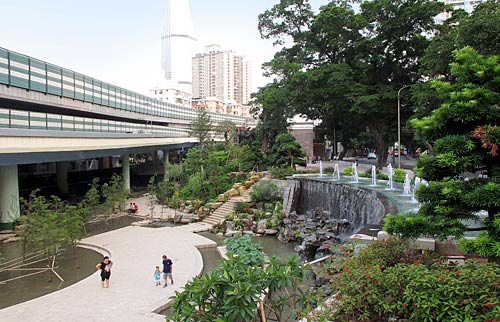|
 |
|
NEW WATERS: The 3-km long Donghaochong stream in Guangzhou has been rebeautifies after the government cleaned the waterway prior to the Asian Games (COURTESY OF GUANGZHOU MUNICIPAL GOVERNMENT) |
No one would believe that Donghaochong Stream, now a leisurely paradise for Guangzhou's citizens, used to be a smelly, stagnant waterway of filth; a stain on the city's image in the run-up to the Guangzhou 2010 Asian Games. After a year of intensive water purification work, the 3-km stream has been transformed into a Parisian-like Seine of southern China—the waters are cleaner and businesses, including Starbucks and other cafes, have sprung up on its banks for tourists and citizens to enjoy.
"I can't smell the terrible odor from Donghaochong Stream that runs by my community anymore," said Li Wenjie, a housewife in Guangzhou's Yuexiu District, who described the old stream as a stinking open ditch of unmentionable odors. Now, the water is clearer and many trees and flowers have been planted nearby— all at a cost of 1 billion yuan ($147 million) to the city government.
Given its successful economic development, Guangzhou, capital of Guangdong Province, has been fighting an uphill battle to clean up the city and reduce pollution associated with the country's modernization efforts over the past few decades. With heavy investments, the Guangzhou City Government has seen remarkable improvement to the city's water and air quality. Ouyang Ming, Deputy Chief of Water Quality for the city government, said more than 48.6 billion yuan was spent to battle water pollution from January 2009 to July 2010.
The environmental protection bureau in the provincial capital said water in the Pearl River and its tributaries that run through the city have become clearer. Air quality has likewise improved.
To make the Guangzhou's waterways cleaner, the city built another 30 sewage treatment plants in the past few months to increase the city's sewage treatment capacity by 2.25 million tons a day. The water quality in 121 rivers and streams with a total length of 388 km has been improved, according to the environmental protection bureau.
The city also spent large sums of money on hi-tech measures to ensure air quality meets state-mandated standards. As of September 1, owners of large vehicles are required to use the highest-octane gasoline to reduce emissions. Its environmental protection bureau has set up 29 checkpoints to monitor vehicle emissions.
Other restrictions have been placed on vehicles and authorities have also closed down construction sites and production in factories that emit pollutants to maintain good air quality during the event.
Traffic will be reduced using the even-odd license plate system implemented during the 2008 Beijing Olympic Games in order to pull about 40 percent of vehicles off the road, improve air quality and ease traffic congestion. But the restriction does not apply to public transportation and Games support vehicles.
To make the city a better place for the Asian Games, Guangzhou invested 109 billion yuan to improve the urban landscape and environment, which included the construction of subways, city roads and bridges. It also included building up infrastructure, integrated environmental management systems and industrial wastewater treatment, in addition to carrying out a program of comprehensive environmental improvement.
More than 70 enterprises have been asked to stop or reduce production during the event to help ease pollution. All decoration and paint spraying work has been required to stop to reduce the emission of volatile organic compounds.
"Facilitating the Asian Games is our priority right now, so of course we'll do what the government tells us to do," said a man surnamed Deng who is in charge of a design and decoration company in Guangzhou. Though the company will suffer some losses due to the mandates, it is worthwhile since it will provide a better environment for the games, he said.
The order will certainly have some impact on companies' regular production, but it won't affect the entire year's production plan, said Yang Yaoxing, Party Secretary of the Board of Guangzhou Iron & Steel Co., Ltd., which is among the 72 enterprises ordered stop or reduce production.
The order could result in possible direct economic losses totaling 10 billion yuan, according to Yang Liu, Deputy Director of the Guangzhou Environmental Protection Bureau.
"We have taken reducing the company loss into our consideration. But some of the companies fail to meet the emission standards and give off too much pollution, so it's necessary for them to pay the price to protect the environment. We have to strike a balance between the two," said Chen Guangrong, Deputy Director of the Provincial Environmental Protection Department. | 